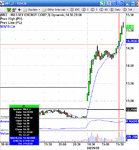True or over-simplistic? Would appreciate your comments.........
Hi Sam,
I'll try and answer your question so that Richard can focus on the nitty gritty of the thread. SB is fine for longer term plays - e.g. swing trading, possibly even intra day swing trading where the trader holds positions for hours at a time. True, there are traders who successfully use SB firms for short term day trading - but there aren't that many of them. Fewer still will day trade U.S. stocks. There are good reasons for this:
1. The spread. The tax that Richard and other direct access traders pay to Mr. Darling - the SB trader pays to the SB firm. Mr. Darling then taxes the SB firm so, either way, your money ends up in Darling's pocket. You pay tax regardless of how you trade, it's just a question of who collects it. Mr. Darling loves SB companies because he collects a whole chunk more tax from them than he does from direct access players like Richard.
2. Direct access players have greater control over their orders and executions. SB clients are at the mercy of the SB firm who make their own prices. If he so chooses, Richard can play the Market Makers game and buy on the bid and sell on the ask, thereby capturing the spread. Try doing that with a SB firm. (NB.
don't ask Richard how he does this - he won't want to answer that Q on this thread.)
3. Very tight stops. SB Co's tend not to allow you to have tight stop loss orders which (most) day traders require. Even if they do, once they're in place, the person on the other side of your trade (i.e. the SB Co.) can see exactly where your stop is because your using their platform to trade with! If it's tight enough and they want to - they'll take it out and you'll be stopped out for a loss.
4. Psychology. Day trading major stock indices via SB firms is one thing as most offer 1 or 2 point spreads these days. Stocks are a very different matter - especially U.S. ones. Richard rarely trades stocks with a spread wider than 3-4 cents, many are less than this. You'll struggle to find many U.S. stocks quoted by the SB firms with spreads this tight. Most will be 3, 4 or even 5 times as wide as the underlying. When Richard enters a trade via Direct Access, he's usually in profit within a minute or two. With a SB firm, you'll start
every single trade with a loss and have to wait much longer for it to come into profit - if it ever does. This will mess with your head big time! If price falters and you lose your nerve, you'll close out with a loss. If Richard is in the same trade and loses his nerve (tehe!), he'll close out with a small profit or maybe at break even at worst. Trading via direct access will help to reduce the psychological pressures and enable the trader to make stress free decisions and trade well. You'll struggle to do this with a SB firm for the reasons given.
The list goes on, but this should give you a flavour as to why day trading U.S. stocks via a SB platform erodes your edge rather than supports it.
Tim.


